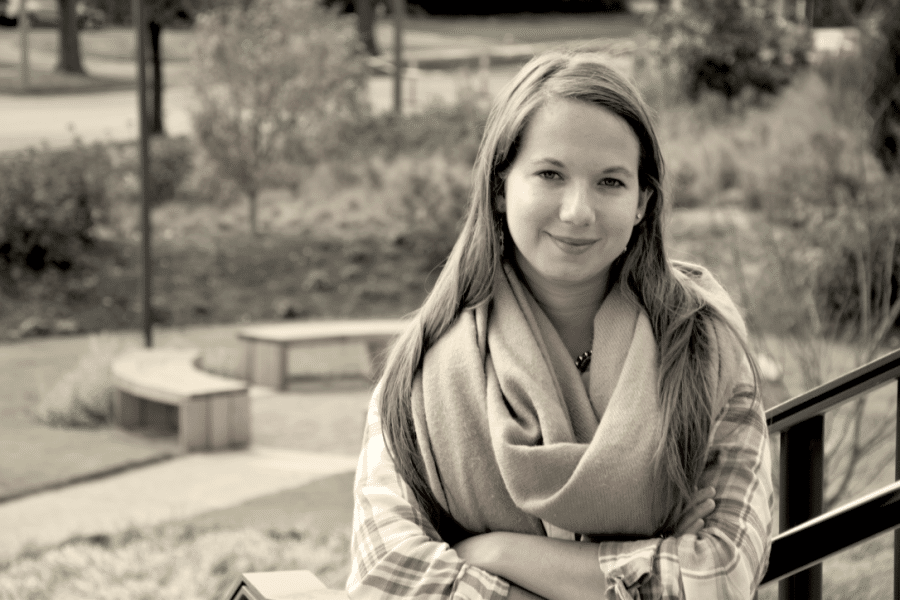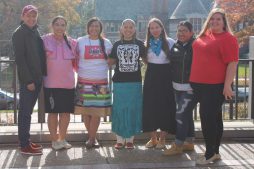
“It’s been an incredible experience being able to feel like I belong, and then being a part of that process with other students and learning from their experiences,” said Citizen Potawatomi Nation member Jenifer Van Schuyver.
She’s working on her Master of Social Work at the Kathryn M. Buder Center for American Indian Studies, part of the George Warren Brown School of Social Work at Washington University in St. Louis. After one semester of classes, there are many reasons Van Schuyver likes the program.
“My favorite thing about it is the energy is like incredibly dynamic, and it’s incredibly supportive,” she said. “I have not felt alone in this process at all.”
Touting an impressive and growing number ways to gain real-world experiences across the nation, scholarships and groundbreaking research opportunities, the Buder Center has significantly expanded since opening in 1990.
Van Schuyver was drawn to the school’s American Indian and Alaska Native specialty within its social work master’s program.
“There are lots of American Indian Studies programs in the country, but there are very few in School(s) of Social Work,” said Buder Center Director Molly Tovar, Ed.D. “What helps drive this center to be such a success is we recruit a cohort each year. … We’ll recruit maybe 15 American Indian students.”
CPN at Buder
Van Schuyver is an Oklahoman and a Citizen Potawatomi descendent of the Melot family. In 2012, she graduated with a bachelor of psychology from Oklahoma State University in Stillwater and received CPN college scholarships.
She also participated in OSU’s American Indians into Psychology, which Tovar helped create years before. The summer program aims to enrich and train students in the field and encourage them to pursue careers in psychology, specifically to serve Native communities.
A college adviser told Van Schuyver about the Buder Center as a “next step” in her education. She wanted some work experience before embarking on earning a master’s degree and researched AmeriCorps programs in St. Louis near Wash U. She began working for College Bound St. Louis as a college preparation coach helping high school students transition to college.
“Something within the last year was like, ‘That’s it. I’ve got to make it over to the Buder Center. It feels right. It feels like I have experience,’” Van Schuyver said. “Now was my time to be making an impact within Indian Country.”
She developed a passion for student retention and Native youth.
“I also have a big passion surrounding higher education; I think that there needs to be more Native scholars in the world,” she said. Her heritage influences that belief. “My dad has always stressed Potawatomi pride. He was like, ‘You’re not just doing this for you. You’re doing this for your ancestors,’ and so he really supported me whenever I wanted to go to college.”
Tovar described Van Schuyver as a model student.
“She’s only been here one semester and she’s already presented so many times on campus and off campus, she’s engaged in the American Indian Student Association, and she’s on the powwow committee,” Tovar said. “She’s phenomenal.”
Opportunities abound
During the seven years Tovar has worked at the Buder Center, she has focused on increasing American Indian enrollment in its social work program, building a community for them and fostering their ideas.
“We’re not going to say no. We’re going to say, ‘Let’s figure out how to make it happen,’” Tovar said. “If we don’t have the funds, we will teach you how to write a proposal so you can get the funds. We will teach you that skill set. I’ve never said no to an idea.”
Many students are nontraditional and have professional careers, Tovar explained. They often move their families to St. Louis to attend Wash U.
“Once they’re here, they’re engaged in diverse experiences,” she said. “They can focus on research. They can focus on community engagement. They can focus on national conferences or create ideas that they want to bring to the school.”
Wash U’s School of Social Work offers five Native American-focused courses. In Tovar’s class, Leadership Development and Evaluation in Indian Country, her students plan the annual Washington University in St. Louis’ annual Pow Wow. Van Schuyver is helping plan the April 21 event.
“It’s intertribal, and it’s a fun event,” Van Schuyver said. “I’m really excited to be here and be a part of the planning process and get to actually kind of help run the show.”
Tovar said a mission of the class and the Buder Center is developing Native American scholars’ leadership skills so they are better equipped to address matters and policy throughout Indian Country.
“Wherever they are, they can transfer those skill sets in whatever environment, wherever they go,” she said. “That’s very, very important to us.”
From pupil to practice
Buder Center students have extensive practicum requirements. They practice new leadership skills while gaining practical experience in a wide variety of roles with different tribes across the country. Many return home or work with their tribe.
“It gives the students the opportunity to know what it’s really like working in Indian Country and how Indian Country is defined,” Tovar said. “Many times, the people and maybe some of the students might think Indian Country is a reservation; that’s not always a true case.”
Van Schuyver will choose her first practicum site in the next few months, and she is impressed by the variety and sense of community. She could work in higher education, child services, develop her grant writing skills or explore clinical psychology.
“It seems that no matter where a Buder scholar goes, a practicum site will follow, which is incredible,” she said. “There always seems to be, even if it’s not at that particular site, there’s a Buder scholar in most cities.”

Tight-knit community
Tovar credits a thriving support system with the center’s growth during her time as director.
“When I first got here, it was just a few students, so it was me reaching out to local community people to help me support the students to finish. Now it’s just very natural and innate,” Tovar said. “They become a family and a community and really, really support each other.”
The sense of belonging combined with newfound relationships with classmates and professors makes the experience easier to process and day-to-day challenges more manageable. Not to mention there is always someone to grab coffee with, Van Schuyver said.
The alumni network created with each graduating class also attracts new students to Buder Center, too.
“I’m mostly learning from other Buder scholars. … They bring in a lot of their own experience from the outside,” she said. “A lot of them did not come straight from undergrad to grad school, so a lot of them actually have worked within their native communities for five, 10 years.”
She encourages other students in a similar situation to consider applying to the Buder Center as they continue their education.
“I would say get started early, and even if you get started late, that’s fine too,” she said. “Just do it.”
For more
Kathryn M. Buder Center for American Indian Studies:
buder.wustl.edu
Citizen Potawatomi Nation Department of Education: potawatomi.org/services/education
